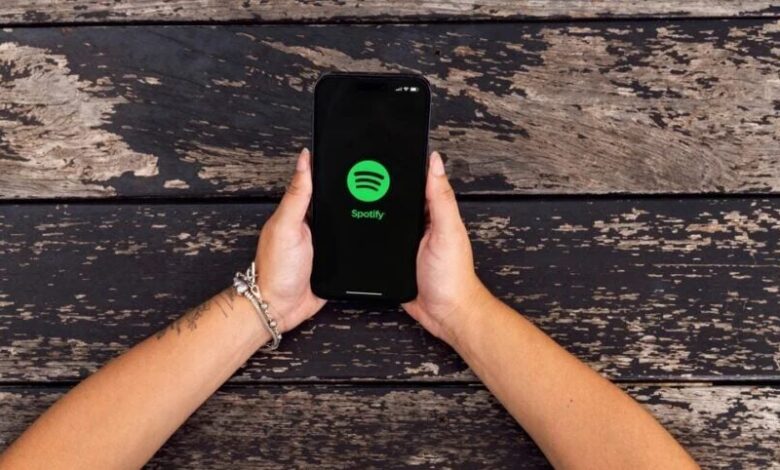Spotify launches new Basic plan in the US, audiobooks excluded

Spotify is revamping its subscription plans in the US, introducing a new “Basic” plan without an audiobooks offering. This move comes after the streaming giant faced criticism for bundling music and audiobooks, negatively impacting songwriter compensation in the US.
Previously, Spotify’s “Premium” plan offered ad-free music listening, unlimited skips, and 15 hours of audiobook access per month for a single price of $11.99, which it recently raised from $10.99. Spotify added 15 hours of audiobook time for Premium subscribers last October, giving paid subscribers access to a catalog of some 150,000 books.
Now, users can choose the new “Basic” plan at $10.99, which provides all the music streaming benefits, but without audiobooks, Spotify said Friday (June 21). Existing Premium subscribers will retain their audiobook access, but new subscribers will have the option to choose between the Basic plan and the standard Premium, which remains at $11.99.
Spotify also continues to offer the $16.99/month “Premium Duo” and $19.99/month “Premium Family” plans that offer the same Premium benefits for two and up to six people living together, respectively.
For those who prioritize audiobooks, Spotify offers a separate “Audiobooks Access” plan for $9.99 per month. This tier grants 15 hours of audiobook listening, but music listening reverts to the free, ad-supported tier. (In a lawsuit filed against Spotify, the Mechanical Licensing Collective (MLC) argues that this is not how the Audiobooks Access plan works, in that it gives subscribers access to the ad-free version.)
Spotify’s launch of a Basic plan sans audiobooks appears to be a response to growing criticism surrounding its bundling practices. In March, the company announced it would reclassify its Premium subscriptions as ‘bundles’ by combining music and audiobooks. Under the legal agreement known as Phonorecords IV, music streaming services in the US can pay lower royalties to publishers and songwriters for music offered as part of bundles compared to standalone music subscriptions.
Spotify’s move sparked outrage from trade bodies, music companies, and even lawmakers, who argued it unfairly disadvantaged songwriters.
By unbundling audiobooks and offering a cheaper Basic plan, Spotify aims to cater to a wider range of user preferences. Price-conscious listeners who don’t utilize audiobooks can now enjoy ad-free music at a slightly lower price point, while audiobook enthusiasts have the option to subscribe to the dedicated Audiobooks Access plan.
The latest move also comes amid increasing competition in the music streaming market. Amazon Music Unlimited offers a cheaper “Individual” plan at $9.99 and a single-device plan at an even lower $5.99.
Spotify, despite its slightly higher pricing, boasts a strong subscriber base. In the first quarter of 2024, the streaming service added 3 million Premium subscribers, up 14% YoY, to 236 million.
While Spotify’s new plans offer more user choice, the issue of songwriter compensation remains. The Phonorecords IV agreement still allows for lower royalties on bundled music. Last week, three US lawmakers have expressed concern over Spotify‘s bundling practice. In a letter addressed to Shira Perlmutter, the US Register of Copyrights, they questioned whether Spotify’s new practice is in line with the spirit of the Music Modernization Act (MMA) of 2018.
Separately, the National Music Publishers Association (NMPA), representing major publishers such as Sony Music Publishing, Universal Music Publishing Group, Warner Chappell Music, and independent publishing companies, has accused Spotify of “attacking songwriters.” NMPA President & CEO David Israelite characterized Spotify’s actions as as “a cynical, and potentially unlawful move that ends our period of relative peace.”
The NMPA has already threatened Spotify with legal action over its new bundling policy and urged Congress to update US copyright law to allow publishers to negotiate in a “free market” like record labels do.
At the same time, the US-based MLC has sued Spotify, alleging that it is underpaying royalties to songwriters and publishers. They argue that Spotify’s application of the rate formula for bundles to its Premium subscriptions is non-compliant with the law.
Meanwhile, Sony Music Publishing had said that it is considering “all options” against Spotify regarding the change, stating in a letter that SMP songwriters and composers in the US have seen their mechanical royalty payments from Spotify reduced by approximately 20%.
Music Business Worldwide
Source link

